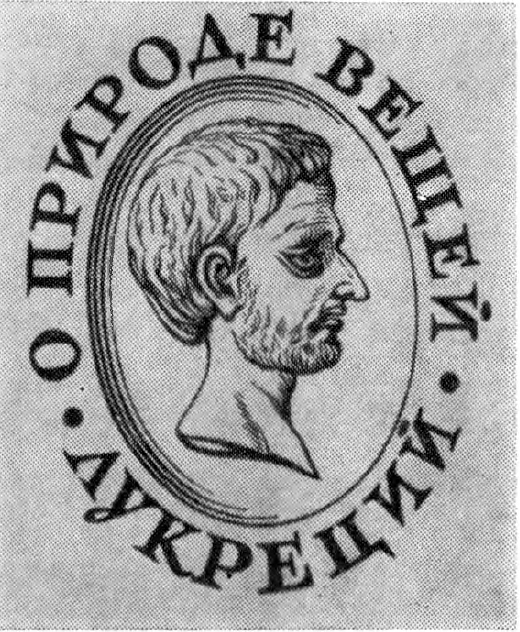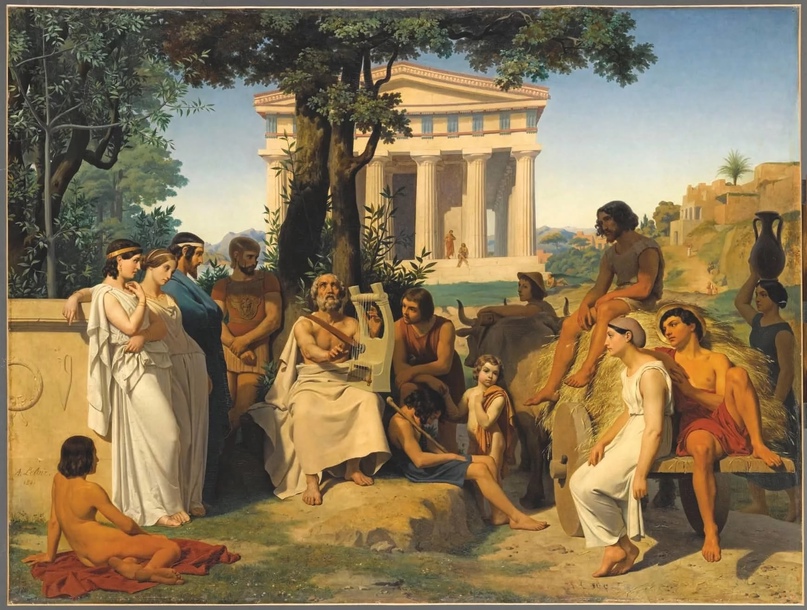
Last time I wrote about the latest in popular science literature. Now, on the contrary, I propose to turn to the origins. If you think that popular science literature is an invention of the 20th or 19th centuries, you are wrong. It all started much earlier. Back in Ancient Rome (maybe even earlier, but such texts did not reach us, I am now talking about works that popularize scientific theories, and not actually scientific treatises). So, "let's go" in the first half of the 1st century BC.
The Roman Republic is in deep crisis. Dictatorship is replaced by dictatorship, war follows war. And the Romans had not yet recovered from the uprising of Spartacus, which ended with the crucifixion along the road from Capua to Rome, six thousand of his supporters. Intrigues, conspiracies, murders have become a daily background in the life of the elite of the Republic, which lived out its last years.
This time fell on the youth of the poet Titus Lucretius , who, like many of his contemporaries, was looking for some new moral and ideological guidelines, instead of the lost ideology of the early Roman Republic (quite strict, by the way).
The inspiration of Lucretius was the Greek philosopher Epicurus, who sought to know natural connections in the world around him, doubting divine intervention and the significant role of fate. The theme for his poem "On the Nature of Things" Lucretius chose one of the parts of the Epicurean teaching - physics. At the same time, he repeatedly emphasizes in the poem: he does not compete with the philosopher, but only follows his teachings, because "neither a swallow can compete with a swan, nor a goat with a horse."

The image of Lucretius, redrawn from an antique gem - this is how he was remembered at that time.
But for us, the poem is important not so much the author's curtsey to Epicurus, as an integral presentation of the atomic concept of Democritus. As a result, the ancient idea of atomism reached the thinkers of the Enlightenment in its entirety, through the hexameters of Lucretius.And not just in its entirety, but also in an accessible presentation. As one philologist wrote: "What Epicurus taught, Lucretius sees." This is especially important if we remember that of the three hundred works of Epicurus himself (which are mentioned in other sources), only three letters and several dozen scattered fragments of different texts have survived .
At the same time, the poet was able to tell about physics in such a way that it was understandable not only to the students of Epicurus, but also to literate Romans in general. That is why I called his poem - the most ancient "scientific-pop" that has come down to us. By the way, the author directly says in the text that he chose a poetic form to make the text more accessible and gives a figurative comparison: when a doctor gives children a bitter but useful medicine, he smears the edge of the bowl with “sweet moisture of amber honey”.
The poem turned out to be a kind of encyclopedia of poetry - in the first three parts the doctrine of atoms, which Epicurus developed on the basis of the ideas of Democritus, is presented, in the fourth - the theory of knowledge, in the fifth - astronomy, geology and the history of human culture, in the sixth - natural phenomena (thunderstorms, eruptions volcanoes, storms, etc.). Thus, the reader of the poem received a fairly complex idea of the "nature of things" at the level at which ancient science was then. As well as about what opportunities science and reason open up for a person:
“ Shipbuilding, processing fields, roads and walls,
Dress, weapons, rights, as well as all the rest of
Life's comfort and everything that can bring pleasure:
Painting, songs, poetry, skillful sculpture of statues
“Need has shown all this to people, and an inquisitive mind
taught them this in constant movement forward …”.

Rumors of Lucretius's poem quickly spread throughout Rome. It was read by everyone, including those who were opponents of the philosophy of Epicurus, for example, Seneca and Cicero. And not only read, but also highly appreciated. The same Cicero wrote to his brother: "She has many glimpses of natural talent, but at the same time art." After that, the famous speaker invested financially in multiplying the circulation of the poem.
Lucretius was glorified by many famous authors of Ancient Rome - Tacitus, Virgil, and Ovid in his “Songs of Love” predicted that his poem would be read until the end of human history. The number of scrolls "On the Nature of Things" went into thousands, so we can safely call it an antique bestseller. And by the way, thanks to this, it has survived to this day.
An interesting fact - the author himself did not give his poem any title, the Romans at first also just talked about "the verses of Lucretius." And the title "On the Nature of Things" has introduced the first scientist-grammar Probus century later, taking it from the starting line, where the author asks for help to the goddess Venus (which by the way that some scholars of the last century have hastened to declare Lucretia militant atheist):
" Be an accomplice to me in creating this poem,
That I am now going to write about the nature of things . "
Lucretius was not forgotten in the Middle Ages, copies of the poem were kept in monasteries (which became centers of publishing), she was quoted by a number of Christian philosophers of that era. But, it is clear that the circle of his readers during this period of history was extremely narrow. And then came the time that was later called the Renaissance. In 1417, the Italian collector of antique manuscripts, Poggio Braccioliniin one monastery I came across a copy of On the Nature of Things, and was so impressed with it that I made a kind of presentation at the court of Lorenzo Medici. Lorenzo generally patronized creative people, so in that environment Lucretius was received with a bang. There is even a version that when the famous artist of that time Botticelli (whom the Medici patronized) painted his equally famous painting "Spring", he was inspired just by Venus from the poem of Lucretius.

That same "Spring", illustration - Wikipedia
As in ancient Rome, Lucretius began to be periodically reproduced, now not by scribes, but with the help of a printing press. In particular, the printing house of Alda Manucius, whose re-editions of ancient texts (they were called "aldins") were considered the best at that time, thanks to careful proofreading and preparation for printing. And in 1563, the first edition of the poem was published with an extensive commentary, which was prepared by the French expert on ancient literature Lambin. Among the subsequent commentators of Lucretius, Einstein was noted.
Since Lucretius has been heard since the 16th century, and it was customary to refer to him, it was not difficult for literary scholars of our time to single out scientists whose worldview was influenced by his poem. In the same 16th century, the French physicist and astronomer Pierre Gassendi became such a scientist, and already his works based on the atomic doctrine as presented by Lucretius were mentioned by Avogadro, Boyle and Newton. Lucretius' idea of sensory perception as the main source of knowledge was supported by Francis Bacon, Hobbes and Locke. And Lomonosov cited a large portion of it (in his own translation into Russian) in his book "The First Foundations of Metallurgy, or Ore Mines." So, we can conclude that the Roman poet-Epicurean did not just make the first attempt to popularize scientific ideas for a wide range of masses- and this in itself for that time was a very bold and extraordinary idea. He also did it so efficiently that his book enjoyed the interest of the thinking reader for many centuries and left a noticeable mark on the cultural history of mankind.
Of course, the history of world science is not glorious by Lucretius alone. And if this topic "falls into the format" of this resource, I am ready to continue it.